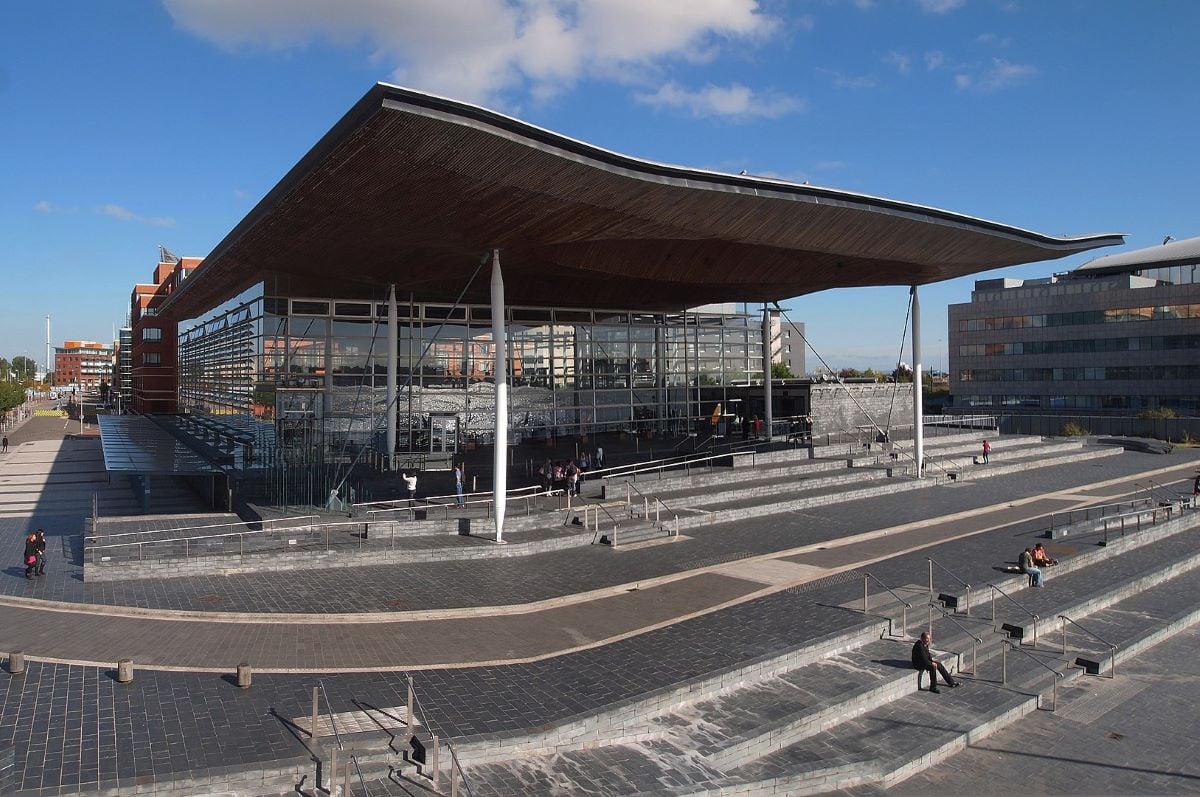
The Senedd building in Cardiff Bay where Dr Faucher gave oral evidence
Photo: Wikimedia
Brexit losses
After a recent appearance before Wales’s Culture Committee, Charlotte Faucher has been rethinking our new relationship with Europe.
If, like me, you are an overthinker, you will remember occasions when conversations have lingered in your mind, when you wished you’d said things differently. This happened recently to me (again) after I gave oral evidence to the Culture, Communications, Welsh Language, Sport and International Relations Committee at the Welsh Parliament (Senedd Cymru) during a session on ‘Culture and the new relationship with the European Union’.
The question that keeps replaying in my mind is about the value of culture and arts in a UK-EU context and how we struggle to quantify the losses caused by Brexit. I’ve written about the impact of Brexit on the UK arts sector before but that analysis looked at the period between the referendum in 2016 and the signing of the EU–UK Trade and Cooperation Agreement in December 2020. Now, a few years into Brexit, we are better placed to assess – and even measure – lost opportunities.
Much more limited mobility
As I suggested at the Senedd, there have been too few studies on the impact of Brexit and the loss of income to the UK arts sector and creative industries. One such analysis is, however, as telling as it is worrying. In August last year the Independent Society of Musicians reported that almost half of UK musicians have had less work in the EU post-Brexit, and 40% have had to cancel work in the EU due to the increased cost of travel and working in the EU.
Visas and carnets, essential documentation for artists and arts organisations hoping to work in the EU, are expensive, prohibitively so in some cases. The mobility of art practitioners and the movement of goods is becoming more and more restricted, and this accounts for a significant loss of income.
In addition, UK arts organisations are excluded from most EU-funded schemes and partnerships and there has yet to be a UK replacement fund for the arts. And the much-heralded new learning exchange programme – the UK Turing Scheme designed to replace the Erasmus+ programme – has attracted criticism. The Welsh government has set up its own version of Erasmus+ – Taith – but to date it has not been evaluated.
From the ‘heart and soul’
Some industries have navigated the post-Brexit years better than others. Recent reports show that the cinema industry and the number of productions made in the UK are growing.
For example, film franchises and high-end TV productions such as Lord of the Rings, and the Marvel and DC Movies, have largely been shot in the UK. Warner Bros’s Barbie (also almost entirely shot in the UK at Leavesden studios in Hertfordshire) contributed over £80m to the UK economy, as reported to the Culture, Media and Sport Committee Inquiry.
In her concluding question, Committee Chair Delyth Jewell MS (Plaid Cymru), returned to the issue of quantifying the effect of Brexit, noting that a lot of “small organisations haven't had the time or the capacity to develop data to show us the economic cost”.
She went on to ask: “Is it, to a certain extent, an inevitable tension that exists because, with the arts and the creative industries, it is something that comes so much from the heart and soul?” My answer (which you can read here in the full transcript) focused on precarity and a reluctance to value artistic creativity.
If I were to speak at the Senedd again, I would stress that blockbusters like Barbie are an important part of the culture produced and consumed in the UK and indeed are significant for the creative industries and the UK economy.
Pivot to the Americas and Asia
But much of the culture impacted by Brexit was produced and created by small or medium scale organisations offering independent and original takes on the arts.
Between 2014 and 2019, a total of 609 cultural projects involving UK beneficiaries received funding from the European Commission’s programme Creative Europe, contributing significantly to cultural relations between the UK and other European countries.
One was the London International Festival of Theatre (LIFT) that received funding for three Cooperation Projects. Among these were Be SpectACTive! – a large-scale European cooperation project in performing art – and UrbanHeat that supported emerging artists to develop new forms of participatory arts practice and create work addressing urgent political and social issues.
With the withdrawal from the EU, the UK has lost some of the diversity and creativity afforded by European networks and schemes, and the support offered to emerging artists. Its cultural outlook is increasingly turned towards the Americas and Asia, to the detriment of Europe, even if it does not always add up in terms of ease, cost of travel or sustainability.
In 1958, Welsh academic Raymond Williams suggested that “culture is ordinary”. In a post-Brexit world, Williams’s words remain pertinent. It is the smaller and medium-sized organisations, as well as institutions of high culture or multinational corporations, that we should promote and value in today’s Britain.
Dr Charlotte Faucher is a Lecturer in Modern French History at the University of Bristol.
![]() @Cha_Faucher | @FrenchUoB1
@Cha_Faucher | @FrenchUoB1
![]() charlotte-faucher-2a12751b4/
charlotte-faucher-2a12751b4/
Research by Dr Faucher: Arts after Brexit and The UK Arts Sector After Brexit
Join the Discussion
You must be logged in to post a comment.